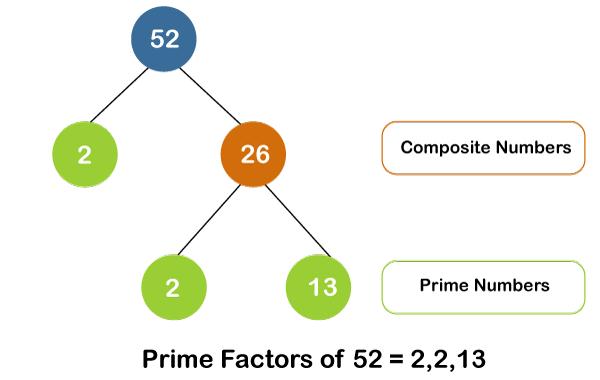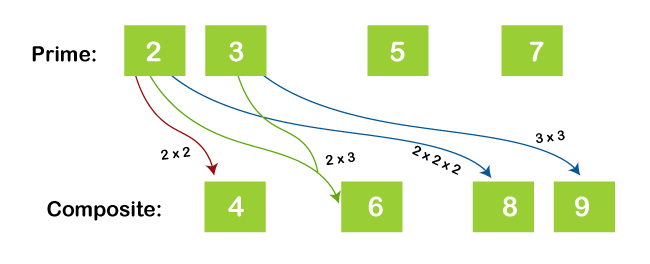Composite NumbersSometimes the composite number is also referred to as Composites. A number containing more than two factors is called a composite number. Composite numbers are just contradicting the Primary numbers. A prime number has just two factors one and the number itself. Those natural numbers that are not considered prime are composite, as these numbers can be easily divided into more than two factors. Examples of composite factors include 6, and the factors are 1, 2, 3, and 6. 
Composite Number in MathematicsIn mathematics, numbers that contain more than two factors are called Composite numbers, or A number that can be produced by multiplying two smallest positive integers and should have at least one divisor apart from 1 and itself. The number always contains more than two factors. Question: Is Zero a composite number? Ans: Zero is classified as neither prime nor composite since it has no factors. Properties of the Composite NumberThe properties of Composite numbers are very simple and be remembered easily. Properties of Composite Number Includes
Methods to Find Composite Number
The method to find the composite number is given below:
For Example: Determine 16 is a composite number or not. First of all, we have to find factors of 16. The factors of the 16 include 1, 2, 4, 8, and 16. Therefore it is a composite number. Composite Numbers from 1 to 200Composite numbers that exist between 1 to 134 are listed below in the table
From 135 to 200
Odd Composite NumberThose odd integers which are not considered Prime are referred to as Odd Composite numbers. Odd Composite prime numbers include 141, 143, 147, and 155 ... Even Composite NumbersThose even integers which are not considered Prime are referred to as even composite numbers. Examples of composite numbers include 18, 20, 46, and 48 …. Smallest Composite NumberQuestion: Why is four said to be the smallest composite number? Reason: 1 cannot be considered the composite number as 1 has only one divisor, and it is the number itself, i.e., 1. 2 and 3: 2 and 3 are regarded as the Prime number as they can be divisible by only two factors: one and the number itself. Therefore, they are not categorized as Composites. 4: The number 4 contains more than two factors. Their divisors include 1, 2, and 4. The number 4 fills all the conditions of being a composite number. Hence the 4 is the smallest composite number Important Facts to be Remember
Prime Factorisation of Composite Number This will give a perspective on the composite numbers are factorized into the prime numbers. The numbers are 1 to 50.
Solved ProblemsQuestion: Determine whether 60 is a composite number and also write the prime factorization Answer: Since it has factors like 1, 2, 3, 4, 5, 6, 10, 12, and 60. Therefore it is also a composite number. Prime Factorisation 2 x 2 x 3 x 5 = 60 Question: Determine the product of the first 5 composite numbers Solution: 4, 6, 8, and 9, 10 are the first five composite numbers 4 x 6 x 8 x 9 x10 = product of first 5 composite number Result= 17280 Question: Calculate the number of composite numbers between 1 and 10. Answer: The composite numbers between 1 and 10 are 4, 6, 8, and 9. Therefore, the total number of composite numbers is 4.
Next Topic555 Angel Number Meaning
|
 For Videos Join Our Youtube Channel: Join Now
For Videos Join Our Youtube Channel: Join Now
Feedback
- Send your Feedback to [email protected]
Help Others, Please Share









